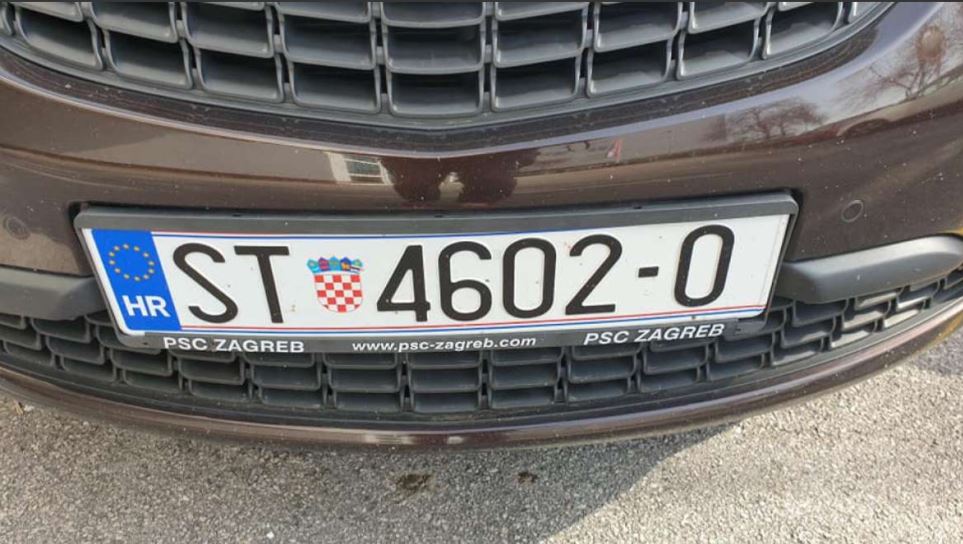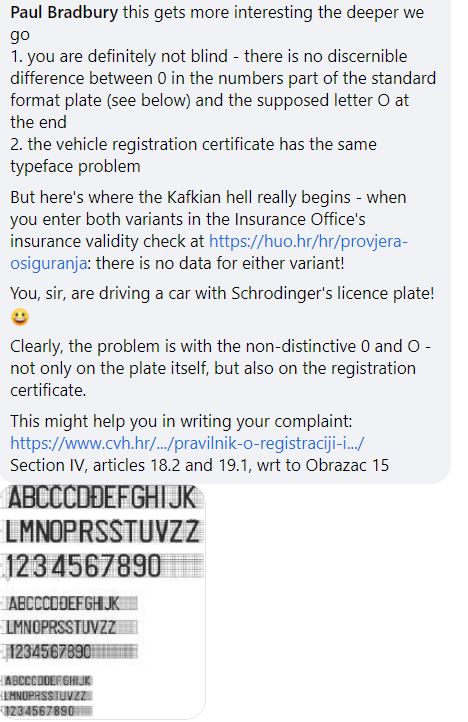How to Beat Croatian Bureaucracy: Proven Method
January 11, 2023 - Is it possible to beat Croatian bureaucracy? An impossible task, but there is an approach which brings the occasional win.
Croatian bureaucracy is legendary, but can it be beaten? There are various ways to approach it, including the right mindset, as I explained in my recent series, 20 Ways Croatia Changed Me in 20 Years - read more in 20 Ways Croatia Changed Me in 20 Years: 3. Bureaucracy and Mindset
But there is also one proven method - also available to locals - which can make Croatian bureaucracy a lot easier. And, as is usually the case in this magnificent but flawed country, it is a solution which was born out of necessity and creativity.
Croats are legendary at finding practical solutions for impossible situations, as they constantly find ways to deal with the absurdity of the bureaucratic jungle which engulfs them.
As I explain in the video below, it all started back in 2010, when the Internet stopped working at home, and I was told that it would be a week until the engineer could come and take a look - a lifetime for a blogger who relies on connectivity to spam the Internet.
An appeal on Facebook for a Croatian solution prompted a suggestion by private message, which resulted in a little trick which has great results. And you don't have to be a fat foreigner to try it - local friends have done so with success.
Here's the latest from the Paul Bradbury Croatia Expert YouTube channel - have you subscribed yet? How to Beat Croatian Bureaucracy: Proven Method.
If, like me, you have a mild obsession with Croatian bureaucracy, you might want to check out our series, Croatian Bureaucracy, a Love Story.
****
What is it like to live in Croatia? An expat for 20 years, you can follow my series, 20 Ways Croatia Changed Me in 20 Years, starting at the beginning - Business and Dalmatia.
Follow Paul Bradbury on LinkedIn.
Subscribe to the Paul Bradbury Croatia & Balkan Expert YouTube channel.
Croatia, a Survival Kit for Foreigners is now available on Amazon in paperback and on Kindle.

Croatian Bureaucracy, a Love Story: 3. E-Invoicing (e-racun)
September 8, 2021 - Continuing our appreciation of the joys of Croatian bureaucracy, the TCN Croatian Bureaucracy, a Love Story series shows its appreciation of the e-racun invoicing system.
A few months ago I sent out my monthly invoices to various clients. Within a few minutes, I had two replies.
The first was a dream client, thanking me for my hard work and confirming that the invoice had already been paid. I checked the bank and there was the money. Zero transaction cost, zero stamps, just one emailed invoice and one online payment. Superb.
The second email was from a different client and explained that they were unable to pay the invoice, as they were in the e-racun (e-invoicing) system. Could I please send an e-racun and they could then process the payment?
At this point, I should explain that although I have had a company for 18 years in Croatia, I have been shielded from most of its bureaucracy and paperwork by my wonderful accountant and wife (two different fabulous people). They take care of most of the daily headaches, leaving me to sign documents, a setup for which I am eternally grateful.
I must confess to being more than a little confused by the second email. What could be more perfect in terms of e-invoicing than sending an email with the stampless invoice attached, to be paid within minutes, with no transaction costs? How could this e-racun invoicing system possibly be more efficient than that?
And so began a journey of discovery into the wonderful world of electronic invoicing in Croatia in 2021.
Although there were some paid options to produce the required e-racun online, the classic way is to visit the state financial agency known as FINA. Having been shielded from the bureaucracy by my wife and accountant, my direct contact with FINA has always been limited to queuing to pay some small amounts in order to get documents.
I decided that it was time I took more of an active role and headed off to the FINA office in Varazdin, complete with my non-e-racun invoice. I had no idea what would come next, or how a shiny e-invoicing system could be more efficient than simply sending an invoice attached to an email and getting paid within minutes with zero transaction costs.
And so it began...
I was informed that in order for my company to send an e-racun, I would have to give FINA a power of attorney, cost 37.50 kuna. In addition to that, the cost of processing and sending the e-racun was an additional 25 kuna per invoice. This was already looking a little more expensive than the free service paid instantly that clients not in the e-invoicing system. Would the invoice be sent immediately at least?
Not quite. The invoice would be emailed to both me and the client the following day.
With limited options, I agreed to proceed. I filled in the power of attorney form and handed over my ID card (I have permanent residence). There was a problem.
In order to sign the power of attorney, I needed my passport (which I did not have with me), not my ID (which I did have). This contrasts beautifully with a recent attempt to withdraw money from my bank with my passport. This was not possible, as only my ID would suffice.
A wasted trip - unless you count the educational aspect of getting to know the e-invoice system. A return journey to FINA was necessary with the passport, my 62.50 kuna paid and the invoice finally issued. Let's all celebrate digital progress.
Weeks passed.
Another round of invoices sent out. Again two quick email responses.
The first was from the same client, confirming instant payment again. The second, from a new client, asking me to submit an e-racun. Here we go again...
I was in Zagreb, not Varazdin, this time, and headed to th local FINA office with the offending invoice. The clerk informed me that I would need a power of attorney, cost 37.50 kuna and a transaction fee of 25 kuna per invoice. I pointed out that my company already had a power of attorney to cover all invoices, and why the need to pay for the power of attorney again?
He frowned, looked deep into his computer then agreed that I did indeed have the power of attorney.
"But that is for the Varazdin office. You are now in Zagreb."
"Are you telling me that a power of attorney to a national institution such as FINA is only valid for the town in which it is issued?"
He confirmed that this was the case. After a short exchange, he agreed to see if there was anything that he could do.
It turned out that there was, and it would be possible to process the invoice for just the transaction fee, but it would have to go through the Varazdin office, as that is where the power of attorney was signed. It was a Wednesday.
"Ok thank you. can you confirm that it will be sent out tomorrow, Thursday?" He could not. In fact, given that we were already in the afternoon and the fact that the paperwork had to be sent to another city, he could only commit to the following Monday.
I paid my 25 kuna and left, wondering at the magnificent of Croatia in the digital age.
You can follow the Croatian Bureaucracy, a Love Story series here.
Read more:
Croatian Bureaucracy, a Love Story: 1. The Car Licence Plate
Croatian Bureaucracy, a Love Story: 2. Foreign Father Attending a Birth
Opening a Croatian Business Bank Account as a Foreigner... in 46 Minutes
Diary of a Croatian Lawsuit: 50 Lawyers, No Secretary, No Hearing
May 27, 2021 - Now I know why Croatian justice takes forever - there is a shortage of legal secretaries. Welcome to Diary of a Croatian Lawsuit, ongoing commentary on the elusive plaintiff, the Croatian National Tourist Board against the defendent, Paul David Raymond Bradbury.
When I decided to start a section on TCN called Croatian Bureaucracy, a Love Story, I really didn't think I would be writing about lawsuits filed against me.
Little did I know that being sued in Croatia would be as fascinating as this. And so far, I have only spent 3 minutes inside a courtroom. I knew this would take some time, but I am genuinely stunned at how the Croatian judicial system is working (I use the last term with some reservation). There is also very little information online in English about the process of being sued, so I thought it might be a useful public service to document my cases. Perhaps someone who is in a position of power can intervene. Not in my case, I am happy to defend myself on both lawsuits, especially with the legal legendica Vanja Juric at my side. By intervention, I mean that the more publicity this farcical system gets, perhaps someone will step in to stop wasting people's time and public money.
Have you poured yourself a large glass of wine? Let's begin.
On June 12, 2020, an article appeared online in the Croatian media. Part of the article featured me, including some quotes. The article was written by someone else on a portal I have no official connection to. In October, I received a lawsuit form the Croatian National Tourist Board, seeking 50,000 kuna in damages for alleged defamation in that article. The journalist who wrote the story was not sued. The portal which published the lawsuit was not sued. No request for unpublishing or a retraction was made. Indeed, the article is still live on the Internet and you can see it here.
A couple of weeks later last October, I received another blue envelope from the Zagreb court. Another lawsuit from the Croatian National Tourist Board, also for 50,000 kuna. This time, the lawsuit was related to uploading a satirical version of the tourist board logo, without comment.
I will confess to being a little intimidated. At least until dear Vanja assured me that all would be alright. Probably the most effective lawyer in media law, she has her hands full dealing with lawsuits with the likes of Index.hr, so this was a tiny case for her.
My first hearing was set for April 10. This being Croatia, the second case (logo satire) was heard first. In we went, my first lawsuit in 52 years. It was really happening.
There were five of us in total - the judge, the CNTB lawyer, Vanja, myself and the stenographer. Three minutes later, it was all over.
Vanja started with a couple of logical arguments why the case should be thrown out, but then the judge informed us that CNTB had filed another motion the previous evening. Such a late filing, in fact, that my lawyer was not given a copy before the hearing. Apparently, the reason for the late filing was due to the fact that the CNTB lawyer had been in hospital the previous week.
It was only later that I learned that the law firm consists of 6 partners and 50 lawyers. I hope that they were not all unwell for the whole week.
The judge ruled that this new motion had to be considered, and we rescheduled for July.

I actually didn't mind too much. Vanja is a very cool - but extremely busy - lady, but we agreed that we would have pints after each hearing. Thanks to these lawsuits, I will have more quality Vanja time than I could have imagined. Thanks for that, guys.
May 3 was destined to be an historic day. At 09:40, the first hearing in the first lawsuit - defamation for the article I didn't write on the portal I don't own. Then at 10:00, the launch of our Total Croatia portal in Dubrovnik, a project directly inspired by these lawsuits.
While the Total Croatia launch went ahead as scheduled (see the press conference with Croatian and English subtitles), things did not go so smoothly with the lawsuit. Four days before the hearing, Vanja received a request form the CNTB lawyer,requesting a delay in the hearing as he was double-booked. When Vanja refused, the court ruled that the hearing would be rescheduled until May 31.
The law firm must be incredibly busy and successful, as none of the other 49 lawyers were in a position to take the appointed lawyer's place. Given that I knew the date of the hearing three months ago, so too presumably did the CNTB lawyer. The only possible explanation for the double booking, therefore, must be that the firm has 50 lawyers and no secretary to manage the booking.
Guess what date it is on Monday?
May 31! The rescheduled court case for the defamation case for the article which is still online a year later, written by someone else on a portal I don't own (I was the only one sued). In rather exciting news, I learned that if I applied in advance, the court could give me permission to photograph and even video the proceedings. How cool would that be?
I fired off my application this very morning. The response was not long in coming: Curiously - and I am sure it was a coincidence, as I am a big believer in coincidence after many years dealing with life here - Vanja got an email at almost exactly the same moment.
My email informed me that my application had been denied because. my case had been postponed AGAIN. I messaged Vanja to ask if she knew anything.
Her email was to inform us that the CNTB lawyer had double-booked again, and so the hearing would have to be rescheduled.
You see the problem with not having a secretary? These double bookings seem to be a big issue. I assume that none of the other 49 lawyers in the firm were available (or perhaps they were all in hospital), and so we get to do this again on - wait for it...
November 22. 6 months from now, and almost 18 months since the article which is still online went online.
Having said 6 months, I must confess that I did not check with Vanja if that was November 22, 2021, or perhaps 2026.
And so there you are, dear readers, fully updated on the current situation. I must confess a touch of sadness at the latest postponement, as i had been looking forward to morning pints with Vanja. And we have much to discuss since these lawsuits were brought up in the Croatian Parliament by another legendica, Centar MP Marijana Puljak. You can read more in You Promised Not to Sue Me, PM: Will You Also Back Anti-SLAPP Bill?
On the other hand, I now have at least two more articles for the series, Croatian Bureaucracy, a Love Affair. One in July and one in November. The publicity that this case has generated for our new Total Croatia portal in many languages, is literally priceless - have you checked out Total Croatia yet?
Croatian justice, the blogging gift that keeps on giving. Stay tuned for more updates in our Croatian Bureaucracy, a Love Affair section.
Croatian Bureaucracy, a Love Story: 2. Foreign Father Attending a Birth
March 5, 2021 - Continuing the new TCN series documenting the absurdity of Croatian bureaucracy for future generations, a look at the procedure a foreign father must endure to attend the birth of his child in a Croatian hospital.
There are many things which change in life when you find out that you are about to become a father. It was something I had never planned, as I really couldn't imagine myself responsible or capable enough to raise another human, let alone two - and my kids will no doubt confirm that my fears were not unfounded). One of the main early decisions to make was of course:
Would I be attending the birth of my first child?
The answer was of course an emphatic yes - what an incredible moment for any man. I gave little thought (at the time) about whether of not there would be any issues as a foreign father in this beautiful land attending the birth of his child.
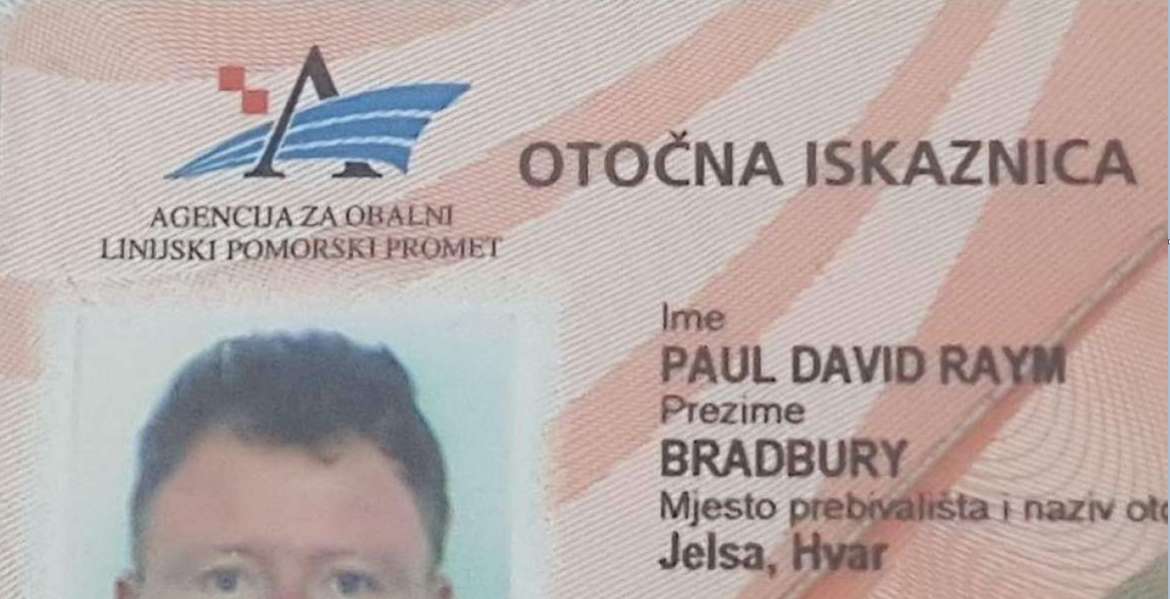
Welcome to the second in our new series, Croatian Bureaucracy, a Love Affair, an attempt to snapshot the absurdity of life in Croatia in a time of massive change. My grandchildren will have no concept of Croatian Bureaucracy as It Once Was, and so this is a humble attempt by this foreigner to give something back for future generations. Croatian bureaucracy has been good to me over the years in terms of writing material, from having to deal with the indignity of having my third name Raymond shortened to Raym to being told by Privredna Banka Zagreb that I would have to travel 160 kilometres round trip to Zagreb and wait two weeks until I could open a bank account, Thankfully, my new best friend Nenad allowed me to open an account at Raiffeisen in Varazdin, a wonderful experience would took precisely 46 minutes.
Before we relieve that unforgettable Sunday night in Rijeka back in 2006, I must reference the first article in this series, whose theme inspired the series.
It all began when I got a parking ticket in Varazdin, despite having paid by SMS parking. The next day, the same thing happened in Zagreb. The car I was driving was not the one I usually do, and so perhaps there was an issue with the licence plate.
Boy, was there an issue with the licence plate. You can read all about it in Croatian Bureaucracy, a Love Story: 1. The Car Licence Plate.
When is a 0 an 0, and when is it a O?
One of the things I love about Croatia is that there are a number of people much better versed in the peculiar ways of Croatian bureaucracy, and they take great pleasure in celebrating its absurdity at every turn. The champion of this, of course, is my good friend Marko Rakar, the man who put 'anal' into Croatian bureaucracy analysis. He is currently engulfed in a quite superb series of correspondence with one of his service providers.
Marko shared the article on Facebook, and his dedicated disciples in absurdity helped to provide some more insights, my favourite of which was from Sasa, above.
My long-suffering wife wrote emails of appeal to both Varazdin and Zagreb, pointing out I was a stupid foreigner, and it is impossible to detect any difference.
And we have a response!
Varazdin, which has always been super efficient in my experience, wrote back the next day agreeing to cancel the ticket, but with a warning that this will not be possible in future. Very reasonable.
From Zagreb, nothing yet, but it has only been 4 days, and there are 11,000 people working at Zagreb Holding, so it could take some time to find someone who actually does any work.
Back to 2006 and my imminent change in status to foreign father...
We (ok not me) decided to have the birth in Rijeka, as KBC Rijeka had the best reputation in Croatia for the birthing experience back then. I absolutely wanted to be there at the birth, by my wife's side at this amazing moment for us both.
But there was a problem.
In order to attend the birth, I would have to attend a pre-natal course. This wasn't a problem in itself, although I tried to point out that I was not the one actually giving birth.
We were informed that there was a 4-week course twice a week, after which I would receive a certificate. The certificate would grant me entry into the delivery room.
All clear and understood.
But there was a problem.
Living on Hvar, the closest course was in Split, which wasn't a problem in itself, the problem was in the timing. Twice a week for four weeks, Tuesdays and Thursdays, starting at 20:00.
The last ferry to the island departed at 19:30.
Unable to commit to two nights in Split each week for a month, I resigned myself to not being allowed to participate in the birth.
"Let's see if we can find a way when we get to Rijeka," suggested my sage wife.
Slightly higher blood pressure one afternoon led to us taking the decision to drive to the hospital early as a precaution. This meant the last ferry from Stari Grad to Split, followed by driving through the night to Rijeka. We arrived in Opatija at 06:00 and decided to have one last coffee together before she went into the hosptial.
Having driven all night, I was gasping and ordered a beer.
"Sorry, Sir, by law, we cannot serve alcohol until 08:00."
Who came up with that one? If it is an attempt to battle alcoholism, then fine, but then why allow people to start at 08:00?
And so we settled into a routine. My daily visits as she prepared to let Nature do its course. My wife explained that this foreign father wanted to attend the birth but was unable to attend the course. Was there any possible way?
Of course!
We were told that at the moment my wife went into labour - but not a moment before - I should go to the reception, fill out an official payment form (uplatnica) for 300 kuna, then take the receipt to the delivery room and bang loudly on the door. Upon presenting the receipt, I was given the protective clothing and allowed to be with my wife for the birth. My left arm still has the fingernail marks to prove I was there.
it is important to note that this was not a bribe. I was effectively buying a ticket to watch the show.
My British friend in Split had the same decision to make a couple of months later. He spoke no Croatian whatsoever, but paid for and attended the course faithfully for 4 weeks. He had no idea what was being said but passed the course with ease and gained entry to the delivery room.
My experience with Croatian bureaucracy as a foreign father was not yet done, as I still had to negotiate the official handover of my new-born treasure to my punica, or mother-in-law.
As we returned to Jelsa, she was waiting for us at the bottom of the steps. I have the best punica in the world, but I will never forget this moment as long as I live.
My wife went up the stairs to our apartment, followed by my punica, with me carrying my daughter bringing up the rear.
My wife went straight into the bedroom to lie down and rest, followed by my punica. I was just about to enter when my punica turned around, took my daughter, thanked me kindly, then shut the bedroom door in my face.
My job as a foreign father was done.
You can follow progress on this and other wonderful adventures into Croatian bureaucracy in our new Croatian Bureaucracy, a Love Affair section.
If you have a story of bureaucratic pain that deserves a wider audience, send your submission to This email address is being protected from spambots. You need JavaScript enabled to view it. Subject Bureaucratic Love.
Croatian Bureaucracy, a Love Story: 1. The Car Licence Plate
February 27, 2021 - Croatian bureaucracy will not be this way forever (we hope!). A new TCN series documenting the genius of life in The Beautiful Croatia for future generations, starting with the Croatian car licence plate.
I was genuinely surprised at how much interest there was in my attempts to open a business bank account as a foreigner last week. Such a normal (in theory) event and hardly the most inspiring of topics, but my celebration of the Raiffeisen Bank hero who opened the account in just 46 minutes, while PBZ told me not only would I have to travel to Zagreb for the privilege of opening one of their accounts, but the next appointment was two weeks away. The article was the third most popular on TCN this week, and you can meet my new best friend Nenad and find out how to do it in Opening a Croatian Business Bank Account as a Foreigner... in 46 Minutes.
The popularity of the article made me reflect that we live in a moment in time (I sincerely hope) where the current bureaucracy will soon be dominated by technology and efficiency, and that stories of Croatian bureaucracy in Uhljebistan 2.0 will be totally alien to our kids. To be honest, the logic of most of the way this country is fairly alien to all of us right now. And as I got back to the car, I got the inspiration to start this series - an attempt over the weeks to document a snapshot of absurdity for my grandchildren exploring the daily grind in this beautiful land.
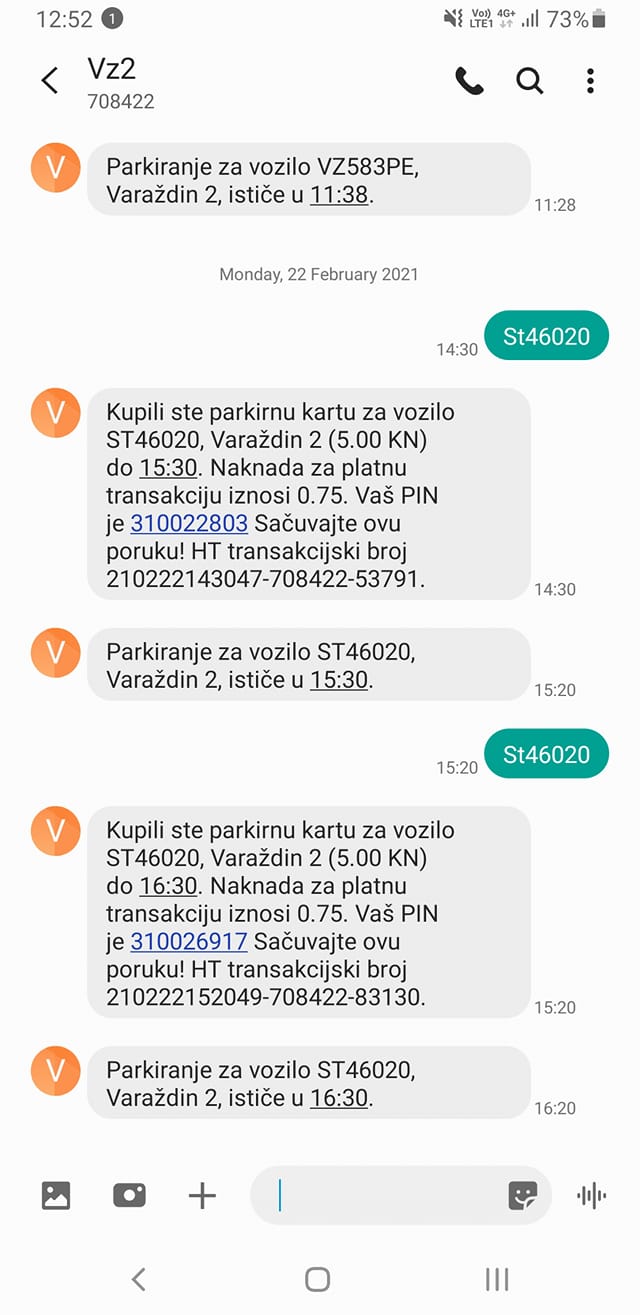
The inspiration was a parking ticket on my windscreen as I returned to the car. I am not driving my usual car at the moment, and I had faithfully entered the Croatian car licence plate number into the SMS parking (fun fact - did you know that SMS parking payment was a Croatian invention?).
No doubt I had made a mistake, I would deal with it later. And on it went to the 'to do' list.
A couple of days later I went on a business trip to Zagreb. I was there for two nights and stayed in my favourite central parking spot which charges just 10 kuna a day. I once again entered the car licence plate number into my phone, and once more I got confirmation.
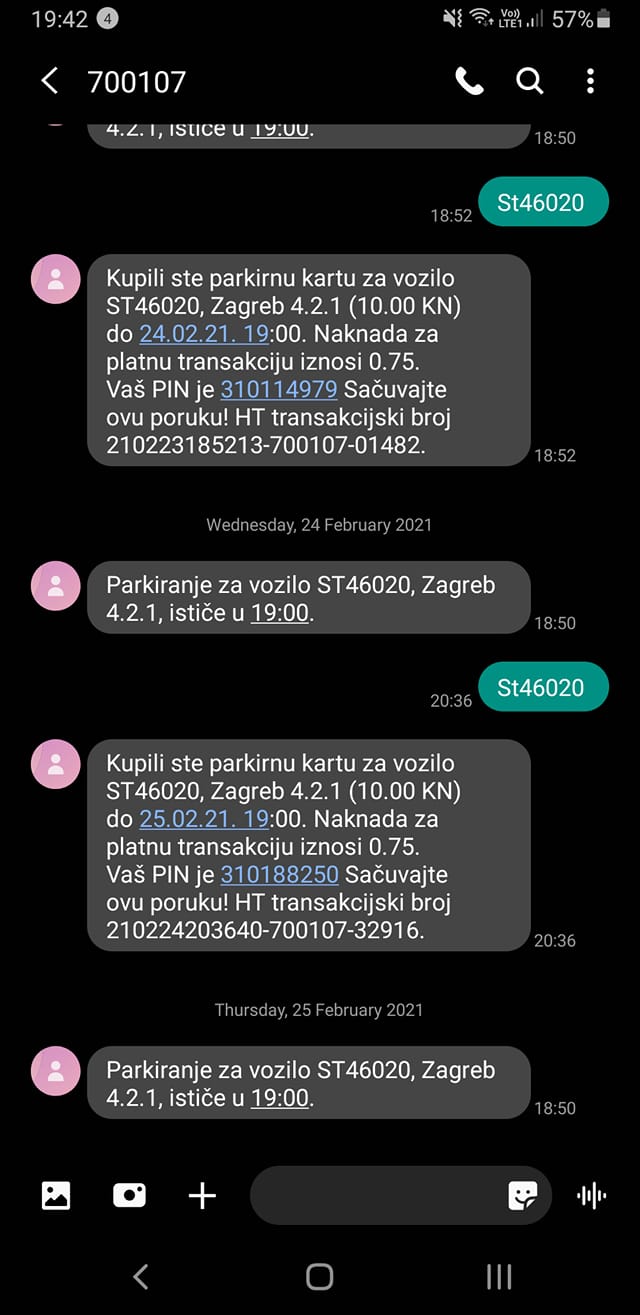
And two days later, when I returned to my car, I was greeted with not one, but two parking tickets on my windscreen, one for each day.
Wtf?!? I could type the number in incorrectly once perhaps, but twice? Not even I am that big of an idiot.
I looked at the number. ST46020, which I what I typed.
Could the two zeroes by the letter 'O'? Did these number plates require a letter at the end? Should it then be ST46O2O?
They looked identical. Don't they?
My next meeting was with the legend that is Marko Rakar. Among all the other amazing things he does, he managed to put the 'anal' in Croatian bureaucracy analysis, and I greatly enjoyed his elaborate explanation of how he was busy educating one of his service providers on how to issue an electronic invoice.
Not having seen the plates, he told me that the 0 in 4602 was a number, and the last digit was the letter O, as this type of Croatian car licence plate must end in a letter (you learn something useless every day in this beautiful land). But if I looked closely, I would notice a difference in font between the number and the letter.
I went to the car and sent him the lead photo above. No difference.
Hmm, he mused, his interest mildly piqued. try the car registration document.
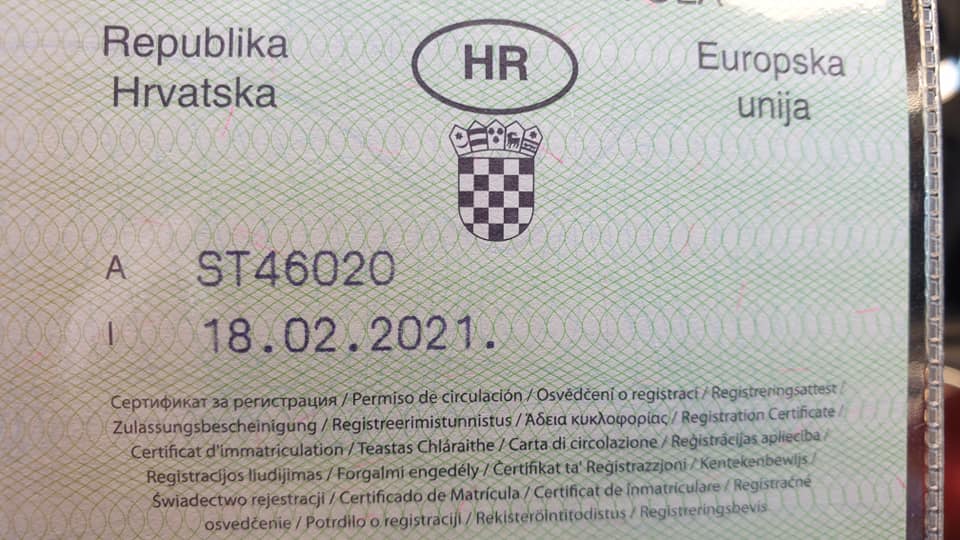
My eyes are not what they once were, but can you see a discernible difference?
Now the MRAK in Black was curious, insisting that the first had to be a number, the second a letter. It would show somewhere.
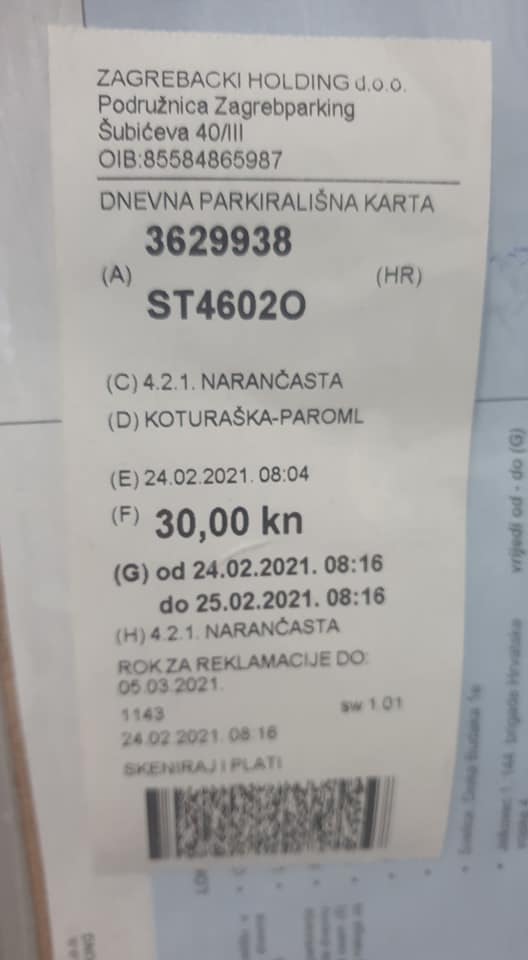
And so it did. In the place that matters most in Uhljebistan - on the parking fine.
Not even a dumb foreigner like me could mistake the zero for the letter in the fine.
I shall appeal, of course, and keep you updated. I am hoping that the MRAK in Black will be able to dedicate some of his precious time to guide me in my appeal and hopefully lead me down some awesome labyrinths of Croatian bureaucracy which will give me more material for this series.
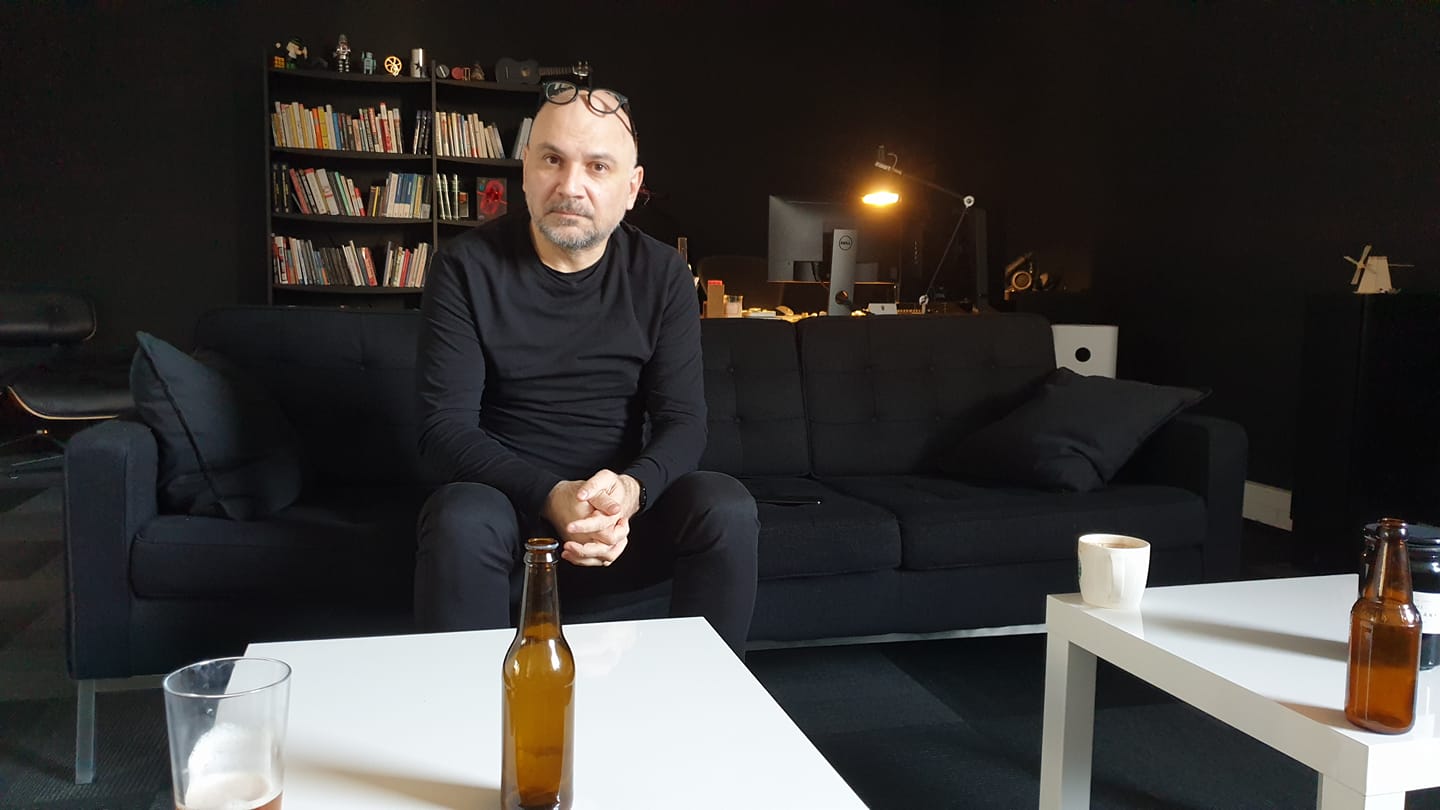
You can follow progress on this and other wonderful adventures into Croatian bureaucracy in our new Croatian Bureaucracy, a Love Affair section.
If you have a story of bureaucratic pain that deserves a wider audience, send your submission to This email address is being protected from spambots. You need JavaScript enabled to view it. Subject Bureaucratic Love.
Opening a Croatian Business Bank Account as a Foreigner... in 46 Minutes.
February 23, 2021 - After being told it would take weeks by another bank, opening a Croatian business bank account in 46 minutes as a foreigner IS possible.
I ALMOST had the perfect day with Croatian bureaucracy last week.
The mission was daunting. First stop, Raiffeisen Bank in Varazdin to sign a leasing contract for my new (not so new) car. Then to the notary to notarise the contract, which I then had to return. Then off to the heroes at FINA to collect the documentation for my new jdoo company. then on to my bank PBZ - where I have had a private and a Croatian business bank account for 18 years. My simple mission was to open a bank account for the new company, return a document to my FINA heroes, then pick up some chicken from the market, and there would be curry for lunch. You can see how I did in 'Beer to Go' to Celebrate a Morning with Croatian Bureaucracy.
As a spoiler alert, I didn't manage to open the bank account. I was shocked to be told that as a foreigner (they did not ask my nationality), opening a Croatian business bank account in Varazdin was not possible. I would have to travel to Zagreb for this. Crazy, I thought to myself, as I headed to the market, the chicken curry now guaranteed. But not too inconvenient, as I would be in Zagreb two days later.
My wife called ahead to make sure it was possible and to make an appointment. It was indeed possible to make an appointment, but the earliest available slot was on March 3, some two weeks ago.
Let me get this right. Opening a Croatian business bank account as a foreigner (the PBZ rules are apparently different for locals) meant I would have to drive 160 km round trip and wait two weeks for the privilege?
In 2021?
My long-suffering accountant, Gordana, confirmed that this was indeed the case after she called the bank to check. A recent change of policy, apparently.
This is nuts, I thought. So I posted on Facebook and LinkedIn, with a challenge to anyone working in the industry. Was opening a Croatian business bank account as a foreigner possible in one day? I even offered to write an article on TCN about the process, which I thought would be a good PR incentive.
I was disheartened by the early feedback. Representatives of various Croatian banks were tagged by my social media followers, but none got in touch. And then someone said that I should try Raiffeisen Bank - you could even do most of the application online.
Really?!?
We checked, my wife called, and it seemed to be true. Or I could do it in person, the very helpful Varazdin branch confirmed. I chose the latter. And I decided to time it.
Arriving exactly at 15:00 my soon-to-be new best friend, Nenad, took my papers, passport and ID and inspected them. All was in order. This should not take long, he exclaimed in perfect English.
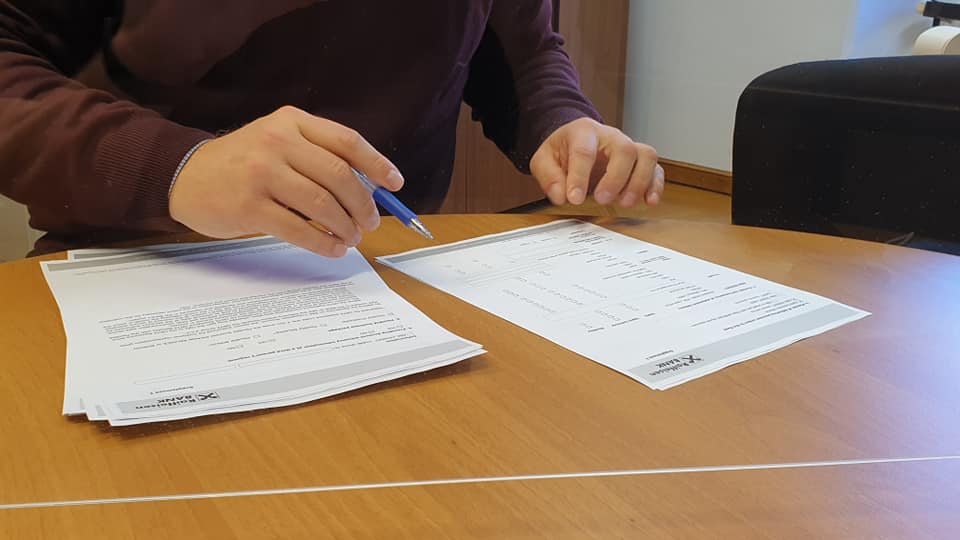
A few questions, a few signatures, and all was done. Could I add my accountant to the account, give her online access and have all the bills sent to her?
Of course, replied Nenad. What is her name, perhaps she is already in our system? And there she was, young Gordana smiling out of Nenad's desktop. We got her on the phone and confirmed some details and all was set up.
Absotulely painless.
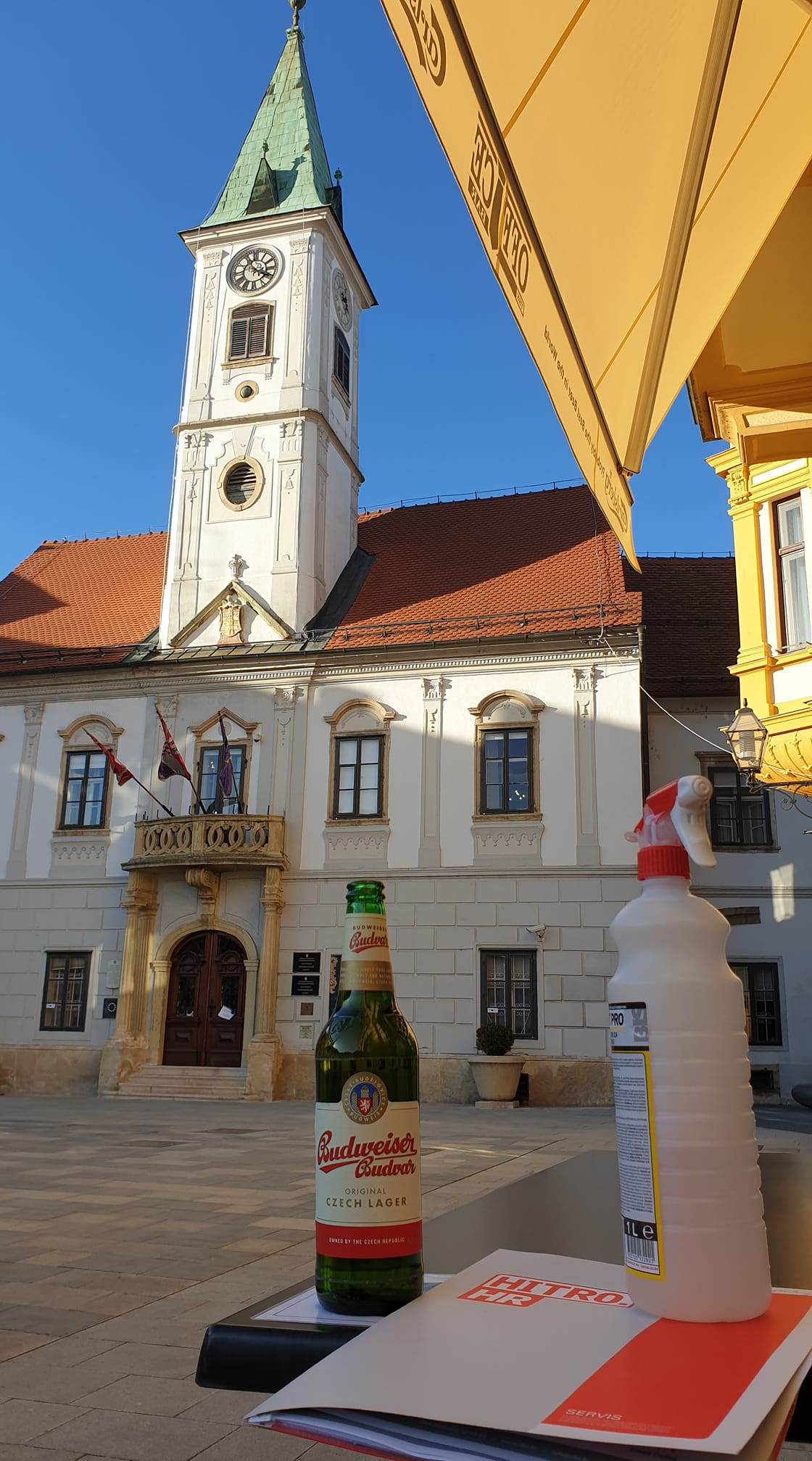
Timeline 46 minutes from start to finish with the opening process, including downloading the application and training on how it works.
Today, I will get the number of the account and the online access codes, and we are ready to roll.
Just 46 minutes in the bank rather than the anticipated hours of torture, leaving plenty of time for the finer things in llfe.
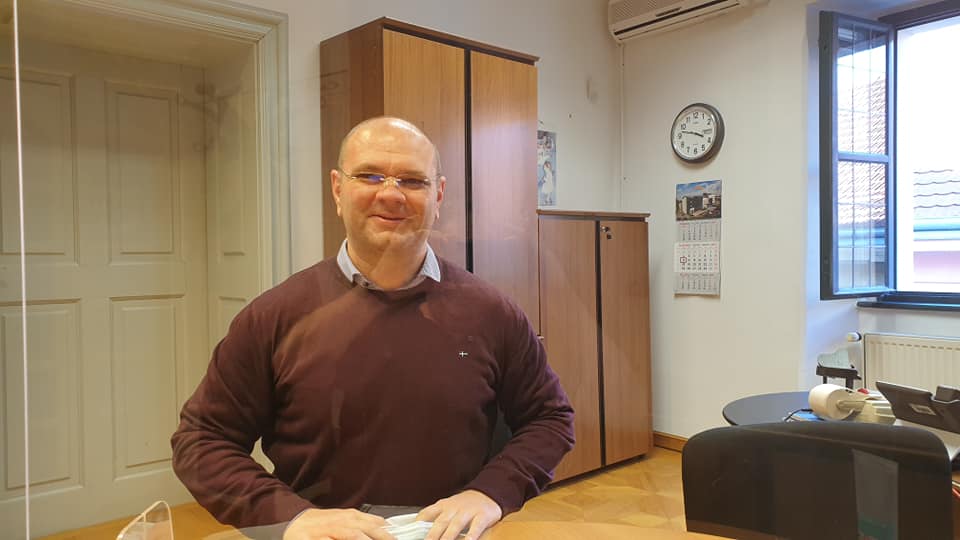
Nenad, I salute you, Sir. A lovely man, for a Liverpool fan. Masked up for the entire process, he did consent to a photo without a mask for this article.
I don't know if Raiffeisen has an initiative for rewarding star employees, but my vote for a gold star and chocolate biscuit goes to this young man.
For more on the joys of Croatian bureaucracy, click here.
'Beer to Go' to Celebrate a Morning with Croatian Bureaucracy
February 20, 2021 - Snapshots of Croatia during the pandemic - a 'beer to go' to recover from a morning with Croatian bureaucracy.
One of the realities of life in Croatia is that you cannot avoid the bureaucracy, no matter how averse you are to paperwork. Admin is something I hate more than anything, and my long-suffering wife has been heroic over the years keep the ship afloat, as I leave important letters unopened, documents unsigned and the like. I would be lost without her.
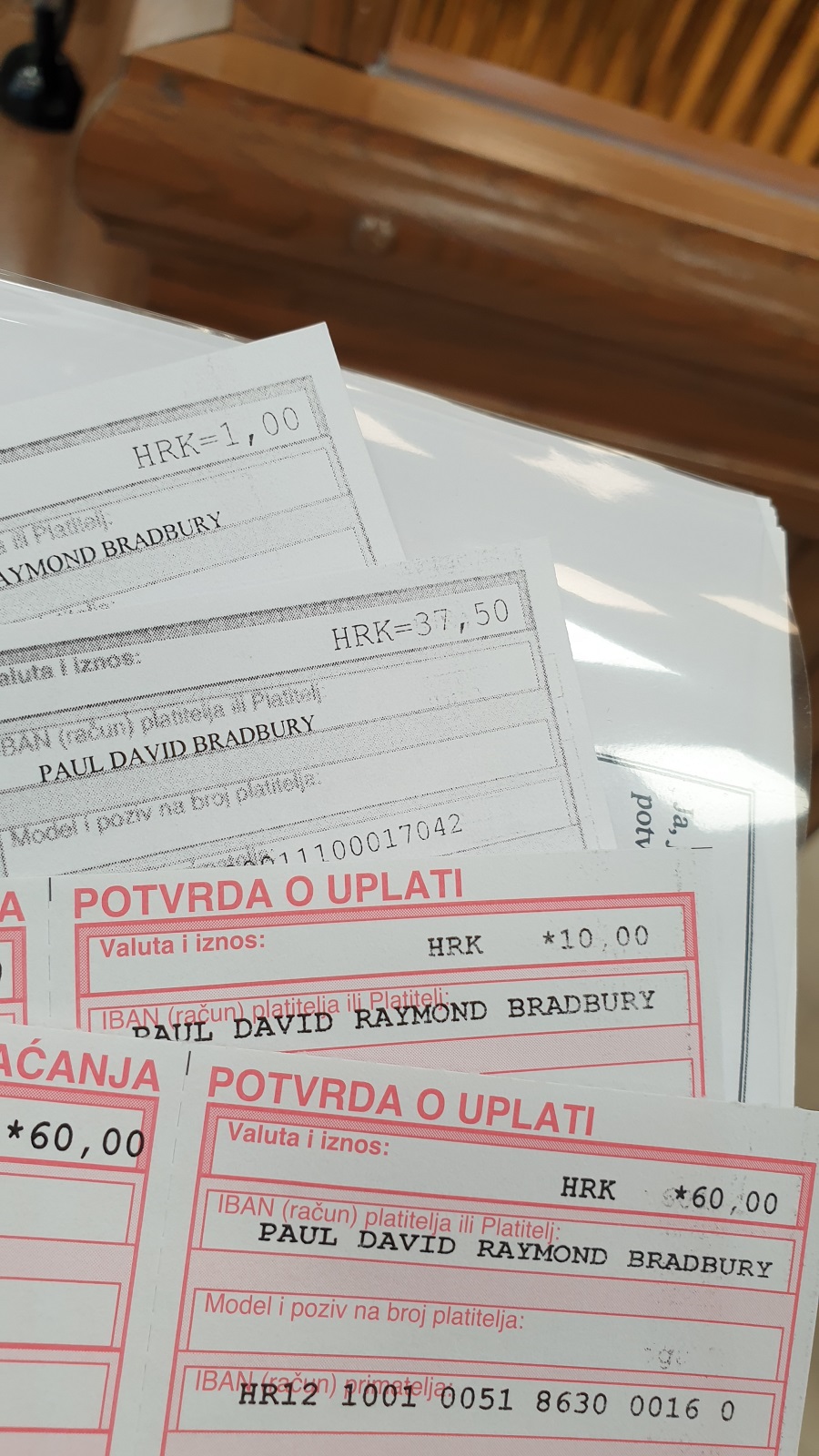
Sometimes, however, I just have to get out there without her help. Dealing with Croatian bureaucracy is always great blogging material, and so it proved last week as I went to open a Croatian company for a new project we have. You can learn more in Croatian Bureaucracy in Action: The Pain Required to Pay 1 Kuna.
This week's bureaucratic challenges looked all the more daunting, and I had allocated what I hoped would just be a morning, but could possibly take all day. Here was my list of tasks on Thursday morning in Varazdin.
1. Visit Bank 1 to finalise a leasing contract for our (not so) new car.
2. Take contract to the public notary to sign and stamp.
3. Return signed contract to Bank 1.
4. Proceed to my heroes at FINA to collect the paperwork for my new company.
5. Visit Bank 2 to open a bank account for my new company.
6. Return to FINA to hand over a document from my new bank account at Bank 2.
7. If I was finished by midday, buy some chicken and veg from the market, asked my wife. Ha, finished by midday - not a chance.
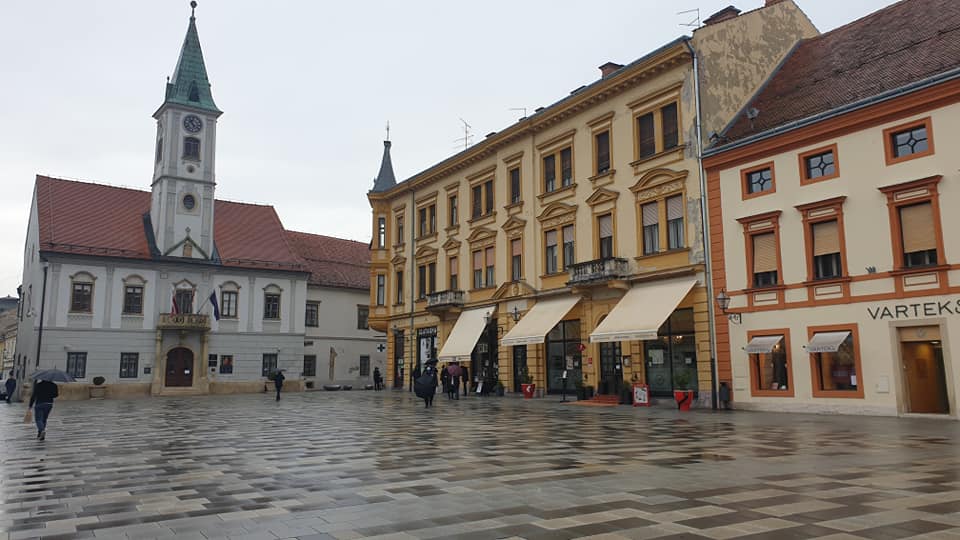
As I criss-crossed the gorgeous old town of Varazdin to my various bureaucratic points of challenge, I felt a little depressed by my normally uplifting surroundings. The bleak weather did not help, but it was the lack of people and cafe tables and chairs.
For we are currently living in the insane world where cafes are closed, but people can buy their drinks and sit on park benches next to the cafes and drink there. In the latest example of the absurdity of life currently in Croatia, cafes were allowed to sell drinks to go from February 15. The fact that they were banned from doing so before, despite places such as bakeries being allowed to, gives an indication of how nuts things are in Croatia at the moment.
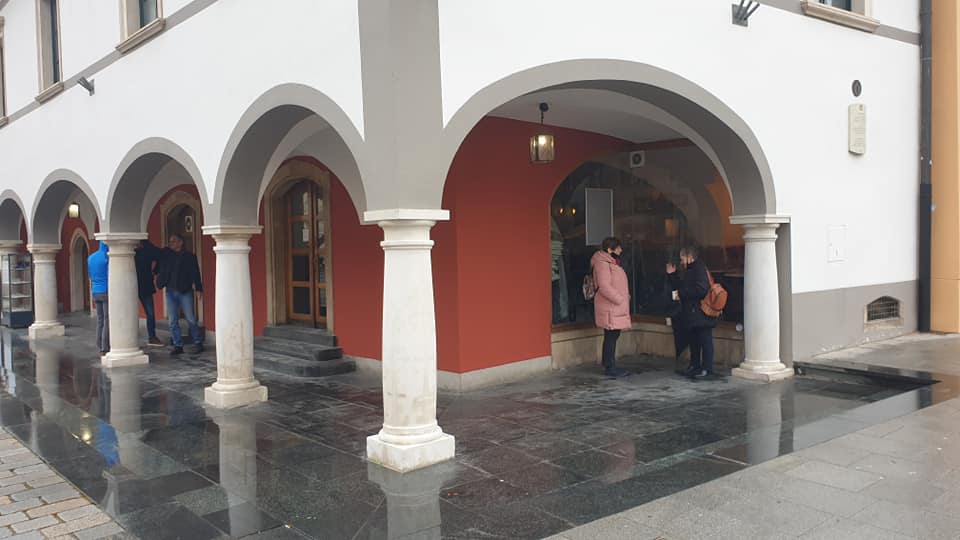
Cafe to go, the reality. A normally popular cafe brimming with life and outside tables and chairs on the main square in Varazdin.
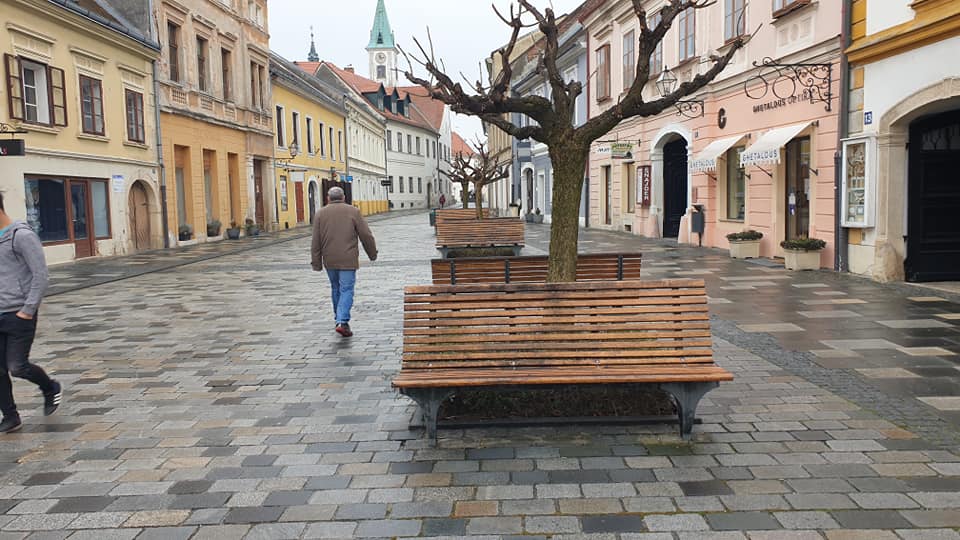
Had the weather been better, there would have been people sitting with their coffee to go here.
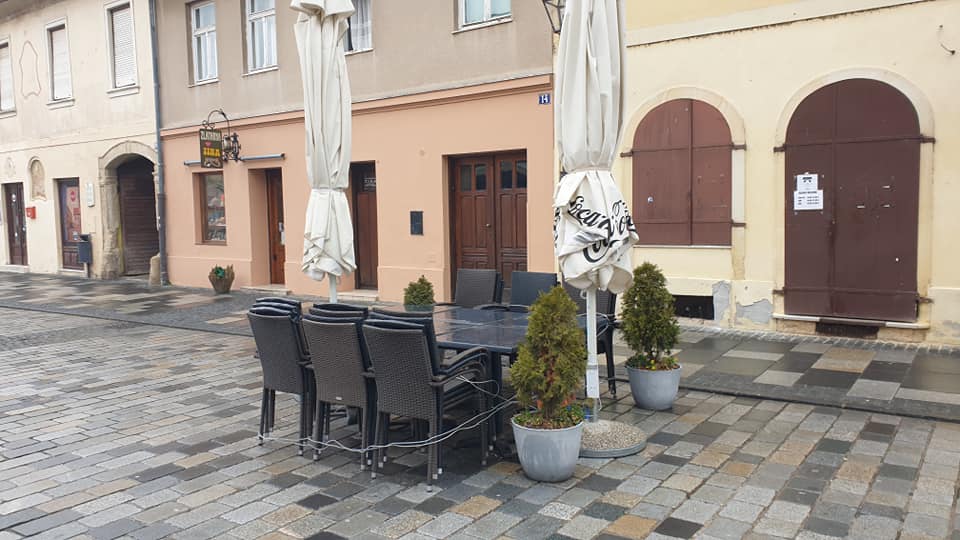
Meanwhile, two metres away...
I digress. Bank 1 was a breeze. The very efficient leasing lady was very organised. All was ready, and she asked me to check the details, presented me with a folder of documents and sent me on my way to the public notary. The notary welcomed me back like a long-lost friend. There was no queue, and all was going superbly until she noticed that the address did not quite match the one on my ID. Here we go...
But this is Varazdin, not Dalmatia. A phone call, an exchange of email addresses, and the revised contract was printed off by the secretary within 5 minutes. Five minutes later, I was on my way.
croatian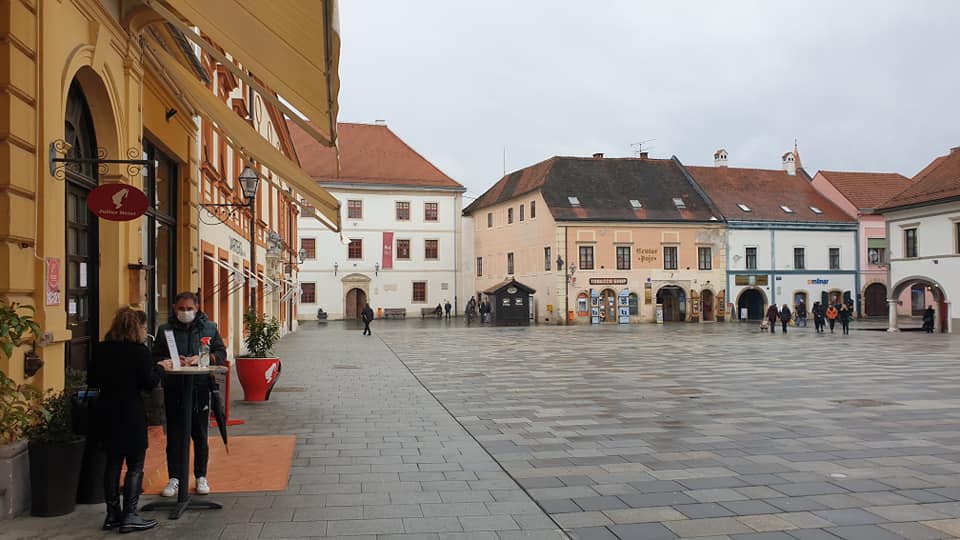
Passing through the gates of Hell into FINA, the very efficient man who processed my application had another neat folder waiting for me. All was ALMOST complete, he assured me. I just had to go and see his colleague and fill out a form, then pop into Bank 2 to open the account and return him a document from Bank 2.
The kolegica looked at me and handed me a form with some rapid-fire instructions. This was the 'make or break' moment for me. If I caved, I would have to figure out how to fill in the form on my own and would probably get it wrong. If she did it, I could be on my way and on course for the market shopping. The prospect of a spicy chicken curry for lunch hung in the balance.
Pressing the form towards me, she clearly wanted me to get out of the way so she could deal with the next person. I employed my most effective defence against such situations when dealing with Croatian bureaucracy. I gave her the 'I am a helpless foreigner who doesn't really understand the language and is crap at filling out forms, but I will stand here and look pathetic until you help me' look.
It worked.
"Give me the form and your ID."
Five minutes later I was on my way, destination Bank 2. Time on the clock - 37 minutes taken so far. I was literally flying. Bank 2 was my bank, I have been with them for 17 years, both my personal and company accounts. This would be over in minutes, the chicken bought, and curry was assured.
"Sorry, you are a foreigner, you cannot open a business account here in Varazdin. You have to do it in our branch in Zagreb."
What?!?
There was no arguing with the lady, rules where rules. My accountant checked with the bank and they have just changed the rules, so the information I was given was correct. I made an appointment with the bank in Zagreb. The next available appointment is on March 3, some 2 weeks away. In a different city.
Croatian banking service in the 21st century.
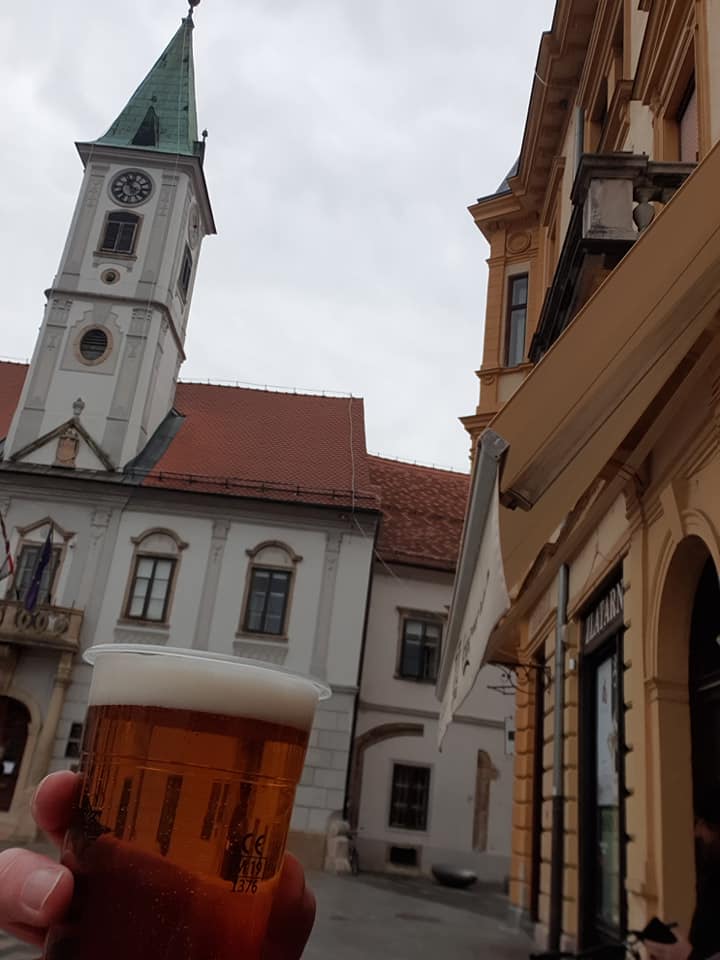
Every cloud has a silver lining. With no account to open and no document to return to FINA, the market chicken and veg were mine, and there was plenty of time to stop for a 'beer to go.' So unaccustomed was I to the realities of cafe life in 2021 in Croatia, the option of stopping off for a cold one did not occur to me.
So there I was, almost alone on the main square, 16 kuna poorer after swapping my cash for a cold one in a plastic glass and just standing there with no tables or chairs around me.
A mildly successful day, all things considered. A little like the chicken and egg conundrum, I wonder what will come first - this foreigner being able to open a bank account or cafes finally opening to end all this madness. To be clear it is the inconsistency that I am referring to when talking about madness. As you can read in our last editorial - As Gym Owner Faces Prison, the Virus Must be Laughing at Croatia's Inconsistent Measures.
Croatian Bureaucracy in Action: The Pain Required to Pay 1 Kuna
February 11, 2021 - Change may be around the corner, but watching Croatian bureaucracy in action in 2021 is quite the thing.
I have a very serious suggestion - an application should be made for Croatian bureaucracy to be given intangible UNESCO heritage status.
Before it is too late.
As parents, we look at the lives of our children in their gadget-infested worlds, and the things that were mainstream in our lives just a decade ago are already alien to them.
And so, too, it seems, in the world of Croatian bureaucracy.
Against my better judgment - and definitely against a promise I made to myself years ago - I opened a sole trader company in Croatia today, the so-called jdoo. And I have to report that things had certainly moved on since my last company formation. The whole procedure at the public notary took under an hour, my startup capital requirement was just 10 kuna, and I was only charged 547 kuna for the entire procedure.
A complete bargain. So much so, that I almost went back to start another.
But I was truly shocked at the response to one of my questions.
"Regarding the stamp, do I have all the paperwork to get it now, and where is the closest place to buy one?"
"This is 2021. You don't need a company stamp anymore."
What?!? How will this company function? And how can the next generation of Croatian entrepreneurs truly enjoy the Croatian experience without the joys of the company stamp to add to their daily frustrations.
If we don't document this moment in time soon, I mused, as I headed over the financial agency FINA to register my shiny new company. UNESCO could protect this gem before all was lost to posterity.
The security guard chap at FINA was very friendly and helpful. Once I had put my hand in the temperature check device, receiving a dollop of sanitiser with my temperature reading, I was sent to the very efficient gentleman assigned to my case.
Lots of documents to sign, and then I was given four payment slips (uplatnice), which covered various fees - one for 60 kuna, one for 37.50, my startup capital of 10 kuna, and - fabulously - a separate payment and bit of paperwork with a fee of 1 kuna, which I learned was to pay for the confirmation of my payment of 10 kuna startup capital. A 10% fee to confirm a payment may sound steep to some of you, but it was a bargain when I saw the amount of effort it entailed to generate the solitary kuna.

Before continuing, I should note I was a little disappointed that my 37.50 kuna came with a shortening of my names. All the other payments were registered to a Paul David Raymond Bradbury, but 37.50 seemingly covered only enough ink for three of my four names.
I reached for my wallet to pay, but was directed to another department, which handles the cash transaction, then told to report back to this desk with proof of payment. Ten minutes of queuing brought me to a very efficient lady, who took my four payment slips and expertly typed the details into the system. My 1 kuna payment had now taken two effort from two employees, and I was rewarded with a confirmation stamp with my returned slip.
But the 1 kuna journey did not stop there. Having returned to my efficient first staff member, he announced that he had to photocopy each of the four slips, one page each, for the records. Which he duly did with aplomb. I also got a photocopy of one, along with my four original slips. Croatian bureaucracy in action - this little kuna was definitely being earned by the State.
But then...
Having paid my bill of more than 120 kuna for services which I had calculated at less than 110 kuna, I went to check the little slip that had been returned to me.
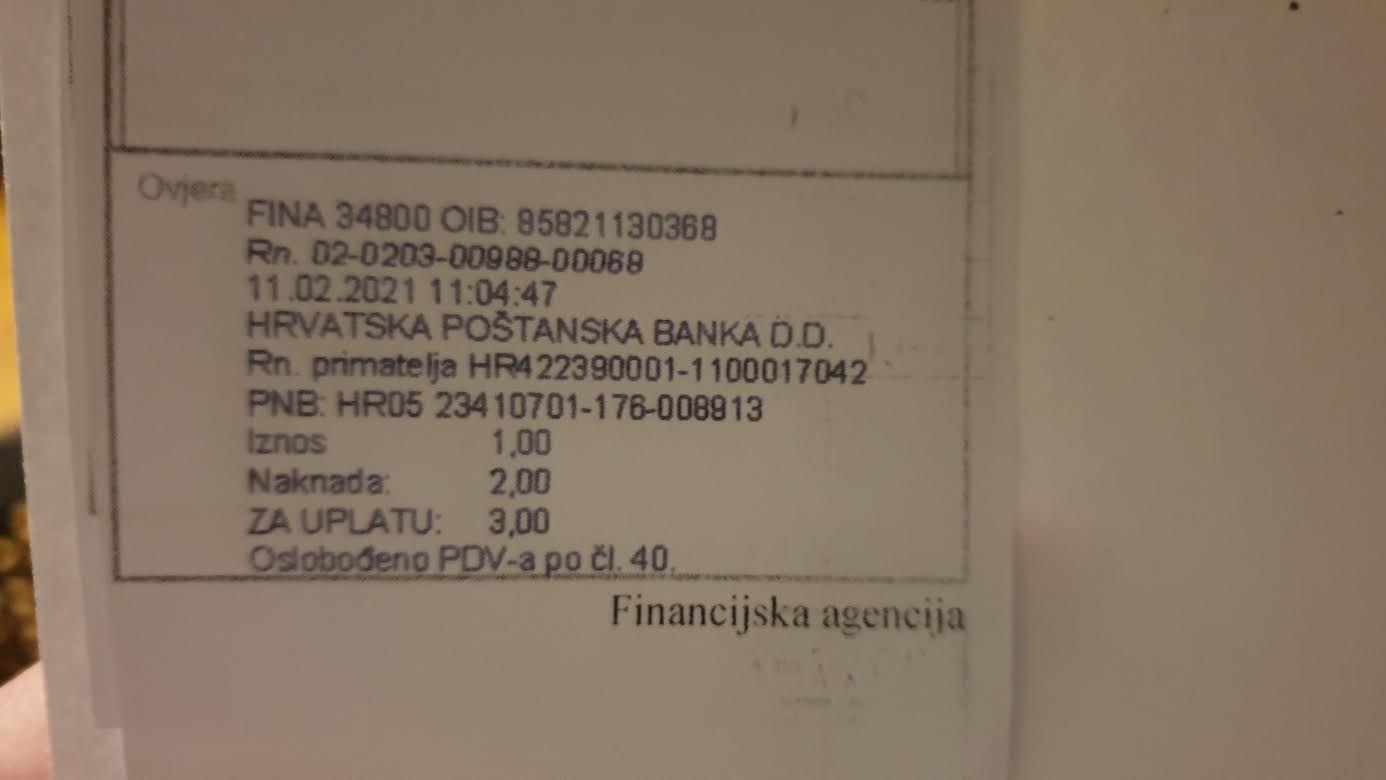
My 1 kuna had become 3 kuna, as I was charged a transaction fee which was double the amount being requested. Suddenly, my 10% confirmation fee seemed a real bargain.
I am possibly the only person in the country who quite enjoys watching Croatian bureaucracy in action for its total absurdity. But with these forces of change, shall I lament the fact that it will soon be reduced to tales of an older generation in the name of 'progress'?
Progress in Absurdistan: Longer Names are Now Possible on ID Cards
July 31, 2019 - Never let it be said that there is never progress in Absurdistan. A bureaucratic victory for those of us with longer names.
My parents did not have the foresight - not their fault, how could they? - 50 years ago to see the possibility of their new-born son emigrating to The Beautiful Croatia.
For reasons best known to themselves, they decided to name me Paul David Raymond Bradbury. Quite a mouthful for Croatian officials, and I have had no end of joy over the years.
As I wrote a couple of years ago in Absurdistan: Why You Should Never Have Too Many Names in Croatia, throw a little Croatian bureaucratic incompetence into the pan, and all hell breaks loose.
As you can see from the photo above, my official name was truncated, as there were not enough spaces in the ID card (or more likely, the online form), and so I became know as Paul David Raym instead, although it might have been smarter to have shortened it to Ray, like my famous uncle.
The names have given me much pleasure over the years, as I see Croatian officials totally baffled as to how to address me. It is one of the reasons I insisted that my daughters had at least one middle name each.
Mr. David? Mr. Raymond? Mr. Raym? I have been addressed thus many times over the years. But my favourite, which has happened more than once when my name is reduced to Paul D. R. Bradbury was the following:
Hello, Dr. Paul.
All this was fun while I lived in Dalmatia, where the laganini lifestyle means that pretty much anything goes. It was only when I moved to Varazdin that I realised there was a 'mali problemcic.'
In order to graduate from the school year, my daughters needed various documentation to prove the identity of their parents.
And it turned out that my kids had not one father, but THREE!
There was Paul David Raymond Bradbury the passport holder, Paul David Raym Bradbury the permanent residence ID holder, and Paul David Bradbury, the chap who married the kids' mother, according to the wedding certificate. The official translator of our British document had failed to translate Raymond into Croatian (I mean, how hard is it?) and so the girls were born in wedlock to a father with not a hint of Raymond about him.
One of the MANY things I love about living in Varazdin is the fact that the bureaucracy is SO much more efficient than in Dalmatia. It is not perfect (this is The Beautiful Croatia after all) but it is much better, at least in my experience.
But now Varazdin bureaucracy was working against both me and my daughters' future education.
The process to bring Raymond back into their father's life should have been a simple one - simply contact the original registrar on Hvar, find the original paperwork and fix the error. But, in Dalmatia, when you need a registrar and only he can do the job, you can almost predict what will happen next.
"No, sorry. The registrar is on sick leave for a month. Then when he finishes his sick leave, he will be going on his annual holiday. Then immediately after his holiday, he will retire. There will then be a public tender and a process to choose the next registrar. Until the new registrar is in place, there is sadly nothing we can do."
And my two girls could have probably graduated from university with Masters Degrees by the time they had sorted it out.
Fortunately, my ingenious wife tried through the system in Rijeka, where the girls were born, and she found a VERY helpful official who was able to fix the problem.
And then, soon after that came the time for me to register my permanent address in Varazdin, which resulted in the need for a new ID card with new address. The very helpful lady at Varazdin MUP helped me through the process, and she was just about to press the magic button to enter all my details when she had the foresight to ask me to double-check the details to make sure there were no errors.
"Is it possible to make Raym into Raymond," I asked hesitantly. "You see my third name is Raymond, not Raym."
She looked, she frowned, and I could sense the cogs ticking round inside the head.
After a moment's pause, she nodded and said those two words which absolutely terrify me when uttered by a public official or especially a lawyer:
Nema problema.
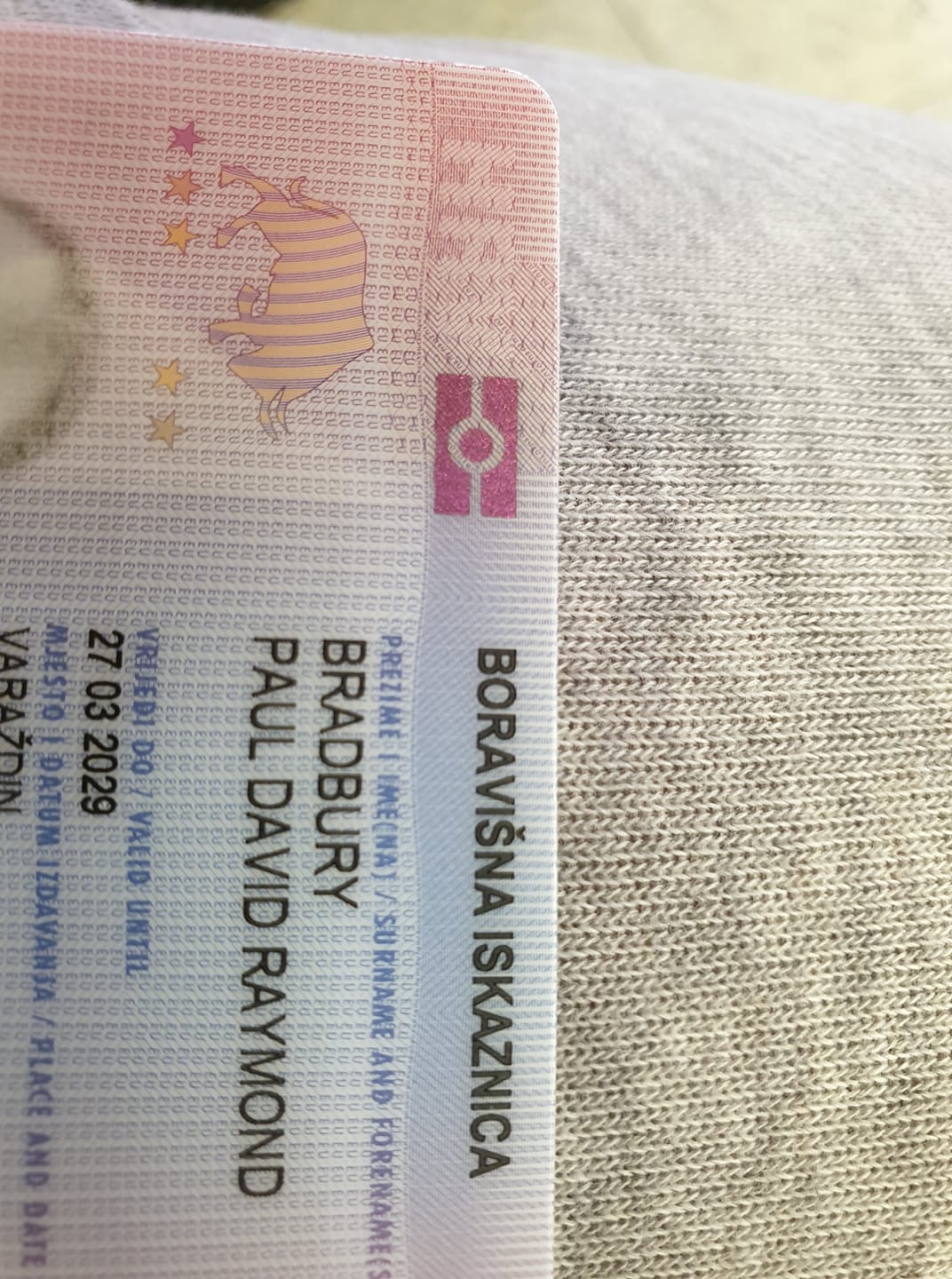
I returned a month later to pick up my new ID, to find Raym had been consigned to the scrapheap.
So for those of you who complain that there is no change in Croatia, I disagree. The national priority of allowing more space on ID cards is working perfectly. You just have to demand your rights.
Absurdistan: Why You Should Never Have Too Many Names in Croatia
Croatia is famous for its bureaucracy, but did you know that having too many names can also be a problem. A marathon paper trail comes to end on June 10, 2017.


